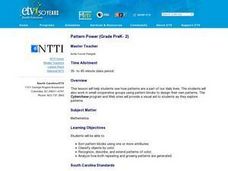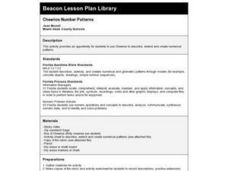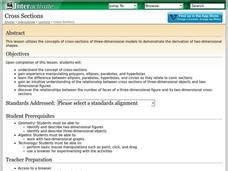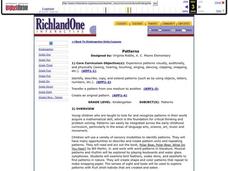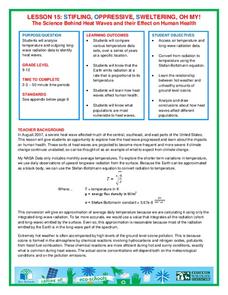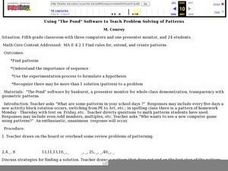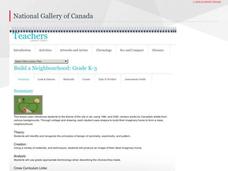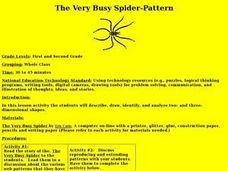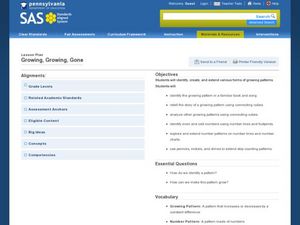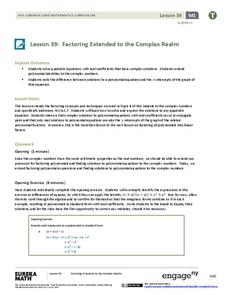Curated OER
What's My Pattern?
Learners recognize, describe and extend patterns in three activities. They organize data, find patterns and describe the rule for the pattern as well as use the graphing calculator to graph the data to make and test predictions. In the...
Curated OER
Representing Patterns & Evaluating Expressions
Write algebraic expressions, determine patterns, and evaluate expressions in a real-world context. Learners engage in a series of collaborative activities to identify, model, and give variables for real-world patterns. They write...
Curated OER
Pattern Power
Young elementary students will discover there are patterns all around them in their daily lives. In groups, they sort pattern blocks by size and color. Using the internet, they create their own type of patterns and share them with the...
Curated OER
Cheerios Number Patterns
Young scholars, following a provided worksheet, use Cheerios to explore number patterns.
PBS
Patterns to the Rescue!
Track down the Cyberchase episode that this instructional activity is associated with. Using a worksheet that is embedded in the plan, learners must find the next two numbers and shapes (a double pattern). Once these have been...
Shodor Education Foundation
Cross Sections
Use this activity on cross-sections of three-dimensional shapes in your math class to work on algebra or geometry Common Core standards. The lesson includes a list of relevent terminology, and a step-by-step process to illustrate the...
Curated OER
Patterns
Students create and extend patterns. In this pattern lesson, students learn to identify patterns using multiple senses. Students work at centers in small groups to explore and extend their understanding of patterns.
Curated OER
Three Little Kittens: Addition Booklet
Students explore math problem solving strategies while reading a nursery rhyme. In this addition lesson, students learn math skills such as solving simple equations, graphing data and extending patterns while reading The Three Little...
Curated OER
Patterns Patterns Everywhere
Upper graders work with number patterns. In this pattern lesson plan, learners recognize and continue number patterns and find the rules. They do some as a class and complete an assessment.
National Wildlife Federation
Stifling, Oppressive, Sweltering, Oh My!
Looking for a hot date? Pick any day in August, statistically the hottest month in the United States. The 15th lesson plan in the series of 21 instructs pupils to investigate the August 2007 heat wave through NASA data, daily temperature...
Curated OER
Investigation - Patterns/Functions
Young scholars explore one-to-one correspondence. Through activities, students examine rhythm and patterns. From the patterns discovered, young scholars create a visual representation of the pattern with blocks.
Curated OER
Investigation - Patterns/Functions
Students will display the first five rows of Pascal's Triangle and discuss in their groups what patterns they see in the rows of numbers. They will give responses and discuss that these numbers form what is called Pascal's Triangle.
Curated OER
Problem Solving of Patterns
Fifth graders use a software program to practice their problem solving skills. As a class, they identify patterns in their days at school and review problem solving patterns in math. They solve different problems and discover that the...
Pennsylvania Department of Education
Analyzing Numeric and Geometric Patterns of Paper Pool
Students use concrete and pictorial representation of geometric patterns to extend patterns. In this geometric patterns lesson plan, students identify patterns and extend them.
Education Closet
Equal Rhythms
Engage young mathematicians in learning about fractions with this cross-curricular math and music lesson. After listening to and repeating different beat patterns, children realize that musical notes are just another way of representing...
National Gallery of Canada
Build a Neighbourhood
What's special about your neighborhood? Build one with your class to find out. Individuals create their dream homes that, when completed, will be placed together around a green space in order to create a neighborhood. Learners also...
Curated OER
The Marvels of Mud
Young scientists roll up their sleeves and get a little dirty in this three-day earth science investigation. Following the scientific method, children monitor the growth of algae in pond water samples in order to determine...
Curated OER
Extending Patterns
In this mathematics worksheet, 1st graders draw the shapes that they see in the pattern illustrated. Then they identify which shape comes first, which comes after the circle, and which comes after the square. Students also draw the shape...
Pennsylvania Department of Education
Extending Pattern Understandings
Students use shapes and manipulatives to demonstrate patterns. In this patterns lesson plan, students also break up patterns to identify a pattern unit.
Curated OER
Patterns Here, There, and Everywhere!
Upper graders access the Microsoft Word program and create patterns by utilizing certain keys on the keyboard. They create picket fences, smiley faces, and hearts. It seems that this lesson has as much to do with keyboarding skills as it...
Curated OER
The Very Busy Spider-Pattern
Young scholars explore two- and three-dimensional shapes. In this very busy spider lesson, students read the story and then create a spider web pattern of their own. The webs must use a symmetrical pattern. Additional...
Curated OER
Growing, Growing, Gone
Budding mathematicians identify growing patterns in numbers and songs then create their own patterns. They look at number patterns and language patterns and then create their own using money and footprints.
Curated OER
Patterns
Second graders work with different types of patterns. In this pattern lesson, 2nd graders go to a pattern block webpage and use Unifix cubes to create their own patterns. They find patterns in the real world and draw their own...
EngageNY
Factoring Extended to the Complex Realm
A solution will work one way or another: find solutions, or use solutions to find the function. Learners use polynomial identities to factor polynomials with complex solutions. They then use solutions and the Zero Product Property to...


